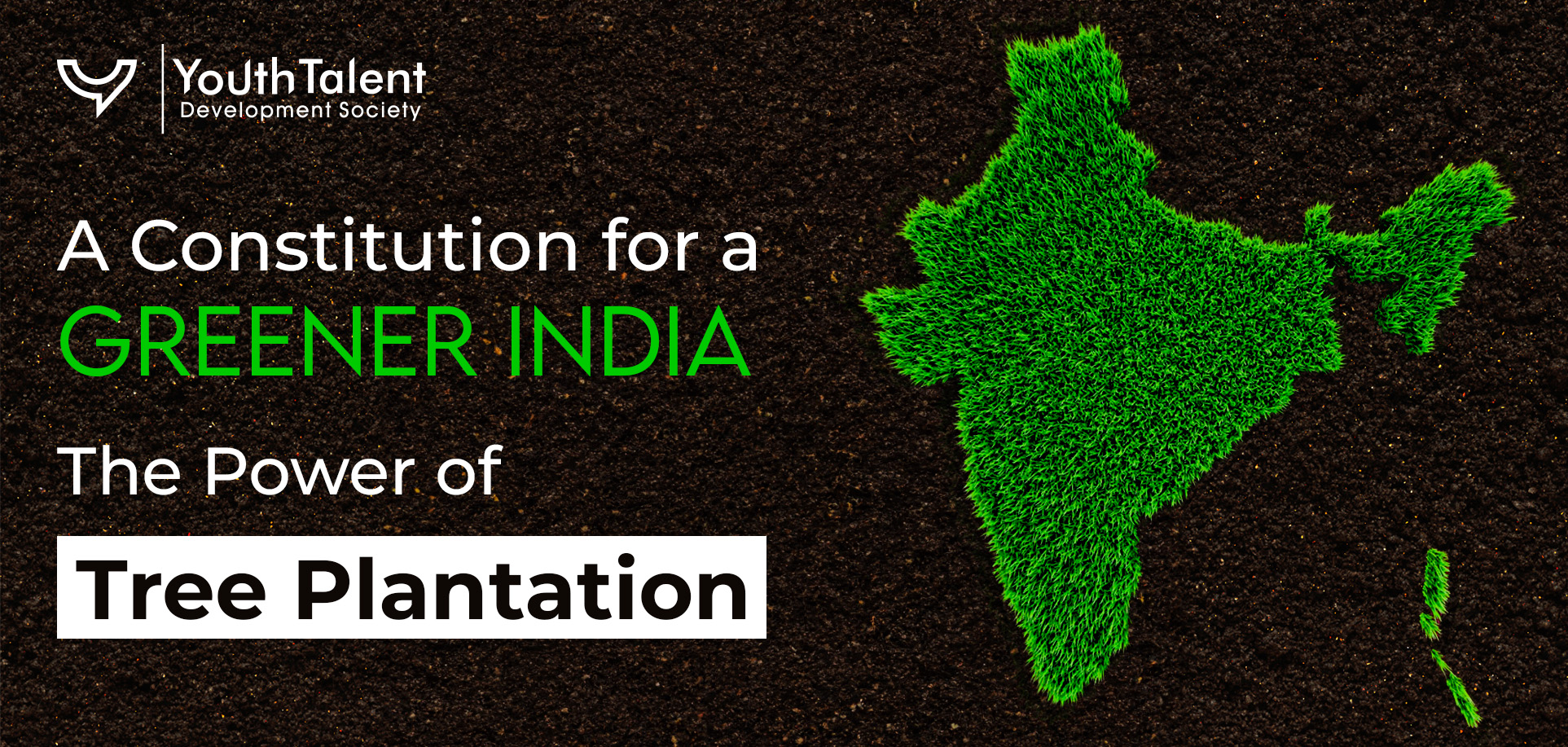
A Constitution for a Greener India: The Power of Tree Plantation
The environment constitutes the soul of sustainable development. Likewise, the Indian Constitution also makes such commitments through Article 48A. It states, "The state shall protect and improve the environment and safeguard the forests and wildlife of the country." Thus, as stressed in this provision, the health of the environment is integral to the "well-being of present and future generations".
Most of such increasing environmental challenges have made the role of tree plantation in solutions that can emanate from them augmenting in importance. Trees are nature's guardians; they provide many ecological, socio-economic services. In a country like India, rich in biodiversity and increasing population, tree planting is not at all a good act. It becomes an imperative means of environmental conservation and sustainability.
The Power of Trees
Supplying External Beauty, trees have certainly more than that. Indeed, such occurs to be potent organs in the commonplace tree to vital integration for environmental balance and adverse environmental degradation. Trees have a number of benefits that can account for the environment.
Trees assimilate CO2 into biomass. They make the air stale, by trapping solid dust particles, absorbing harmful air contaminants, and emitting oxygen which makes air more breathable in both urban and rural settings.
The trees' roots bind to the soil, preventing erosion and improving its richness by adding organic matter provided by trees, which could, in return, boost agricultural productivity. The habitat thus provided is good for up to hundreds of species and thus contributes to biodiversity conservation for sustainable management of India's rich flora and fauna. Trees further cool the area, control rainfall, enable water conservation, and reduce heat in urban areas. It provides both humans and wildlife with a cool, stable habitat.
The plantations are not only a boon to the environment but also provide socio-economic benefits. A good life requires good green space to develop communities. Tree planting programs are creating job opportunities, especially rural ones, through nursery management, plantation, and maintenance activities. The health benefits arising from tree planting include environmental improvements that lead to noise and air pollution, as well as the improvement of physical and mental well-being.
The Constitutional Mandate
A new article, 48A, has been incorporated into the Constitution through the 42nd Amendment published in 1976, declaring that 'it shall be the duty of the state to protect and improve for the present and future generations the environment and to safeguard the forests and wildlife of the country.' This article goes hand in hand with the Directive Principles of State Policy and seeks to encapsulate the vision of sustainable development to which governance in India is to be aligned.
Protection of the environment happens to be a right or privilege of states and to be admitted here does not function under the state or any governmental authority. These are the duties explicitly stated under Article 51A(g): "It is the duty of every citizen to protect and improve the natural environment, including forests, lakes, rivers, and wildlife, and to have compassion for living creatures.”
These two pillars-the governmental obligations and citizen involvement are the building blocks of environmental protection law in India: and the whole idea of tree planting seems to be the most manifest and direct act such an individual or people could take to fulfill that constitutional duty. Citizens plant trees for their active contribution toward the fight against climate change, restoration of ecosystems, and a greener India.
YTDS’s Commitment to a Greener Future
The manifestation of how such collective action can bear fruit in the farthest reaches of constitutional ideals is YTDS. It is directed towards the development of sustainability through various environmental programs, with tree plantation as having the topmost priority.
The #PlantAMillionTrees initiative is one of the flagship projects of YTDS with an eye-focused goal of contributing positively to making life greener and more sustainable. Having already reached a milestone of 150,000 trees planted, it is a testament to how organized environmental efforts can make a difference: for every single tree planted under this program, a step is taken toward adding the environment by reducing deforestation, purifying air, and improving biodiversity.
Evidently, the tree plantation is more than just environment-friendly efforts by YTDS. It creates a sense of ownership by the real participants by involving the local communities in the activity. Such shared involvement would forge community ties, pave the way for job creation, and stimulate environmental education.
The measure of success of the efforts of YTDS is not in terms of the number of trees planted but in their long-term advantages to the environment and society. The stuff that is central to sustainability also is what the constitutional mandate speaks of, from legal principles into action.
Call to Action
Everyone has a duty to fulfil for a sustainable future. Here, YTDS asks citizens to join in the initiative #PlantAMillionTrees through volunteering, donation, or tree plantation.
Tree planting is the simplest act by which each one can contribute to a combined cause. It shows the way that efforts get multiplied when joined with an organization like YTDS, and strong perceptions can come true toward a greener India. This is a marked experience of appointment, not only for fighting against climate change through participation but also for community.
The platforms are designed to reach those looking for an avenue where they can make a difference. Through this, volunteers can participate in plantation drives, maintain the planted areas or create awareness on the importance of planting trees. Donations would help obtain resources for such initiatives and ensure the organization moves towards more impact.
Conclusion
Environmental protection is not a distant dream; it is urgent and is incorporated into the Indian Constitution's framework to be carried forward. Tree plantation is indeed a very strong method of recognizing environmental problems in ecological and socio-economic terms.
In India, environmental protection is a constitutional obligation on citizen's part, and they must support a green and sustainable future, using initiatives such as #PlantAMillionTrees. Great progress could make the shape of India's environment and, in the future, sustain the ecosystem.
One could have a greener tomorrow, step by step, little things at a time. Starting today-a tree now gets planted-investment into the environment, promise of life, and hope for tomorrow. Together we can make India greener, one tree at a time.


